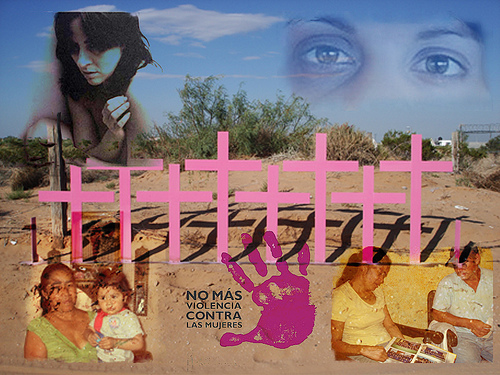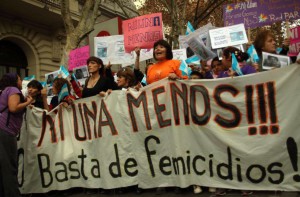Femicide: The Silent Reality for Women in Machista Societies


In the wake of sixteen year old Lucia Perez’s brutal homicide, during which she was drugged, raped, and killed by two men, Argentinean women have garnered international attention in their battle against femicide, which takes the life of an Argentinean women every 30 hours. Perez’s death is only one of the numerous and rapidly increasing examples of femicide, which is the intentional and brutal victimization of women, either physically, sexually, or emotionally. A family violence monitoring system in the province of Medeza found that 80% of females registered in the system had reported to being victims of physical or emotional violence in their lives, 70% of which were victims of domestic violence. The Domestic Violence Bureau (Oficina de Violencia Domestica) received 11,273 domestic violence-related complaints as of October of 2015, 10,252 complaints in 2014, and 9,920 complaints in 2013, with the most common victim being female.
These statistics, however, do not reflect the severity of the situation, as many women fail to report their abuse due to the guaranteed machista (macho) backlash. The machista attitude, which undergirds Latin American society as a whole, not only encompasses traditional patriarchal views, such as the objectification of women and the reinforcement of traditional gender roles, but also embraces “victim blaming” rhetoric that dehumanizes and silences women. The machista attitude defines almost every aspect of Argentinean culture, including the judicial and political institutions that are responsible for combating femicide As a result, reforms within these areas are ineffectual without a cultural reform that addresses the inferior perception of Argentinean women, which is fostered within individual households and reinforced by various Argentinean cultural outlets. In general, Argentinean media, like television shows and music, tend to place women in positions of inferiority that promote abuse and reinforce gender stereotypes, such as the reduction of females to “good wives and mothers”. Such rhetoric both exacerbates machista attitudes and rationalizes femicide, sending a blatant message of societal complacency that leads many women to feel increasingly distrustful of the very organizations that are supposed to protect them. The prevalence of the machista attitude within Argentinean institutions isolates women and leaves them with few options, forcing many to suffer physical, psychological, and sexual abuse in silence.
The judicial system represents one of the most problematic examples of institution failure within Argentina, as it fails to protect victimized women. Currently, the prosecution of abuse cases, such as rape, requires the testimony of the victim (or signs of a clear visible injury) and the testimony of a witness, which proves difficult in many cases. This standard re-victimizes women by forcing them to testify in front of their perpetrators within machista-oriented judicial bureaus and leads to high impunity rates and lenient sentences, as many cases lack witness or even victim testimony due to insufficient legal counsel for victimized women. The current system fails to protect and support victims during invasive legal proceedings, as women are not only re-victimized in the courtroom but also subject to potential reprisal of their abusers. Re-victimization is even worse amongst law enforcement officials, as they “minimize complaints“, misplace their focus on victims instead of perpetrators, and fail to protect victims from further abuse— all of which deters women from seeking assistance and filing official complaints. The Victims Against All Forms Of Violence Program (Programa Las Víctimas contra las Violencias) indicates that 35-38% of victims that call the line for support fail to make an official complaint, and even if they were to make an official complaint, it is unlikely that there would be any long-term effect: Argentina lacks a national registry that tracks and monitors femicide as well as programs that provide direct assistance to victims during and after the event, leaving victims vulnerable and alone even if they report their abuse.
In 2009, Argentina passed the Ley de Protección Integral de Mujeres (The Integral Protection Act for Women), which “prevents, sanctions, and eliminates violence against women within all manifestations and circumstances” (author’s translation). The Ley de Protección Integral de Mujeres is centered around the elimination of gender discrimination, the reinforcement of a female’s right to a life without violence, the development of a political and interinstitutional attitude against femicide, the improvement of the prosecution of femicide, and the establishment of “integral assistance” to female victims of abuse. While this law addresses important issues in combating femicide, this law is insufficient without the enactment of other laws, such as the Plan Nacional de Acción para la Prevención, Asistencia y Erradicación de la Violencia contra las Mujeres (The National Action Plan for the Prevention, Assistance, and Eradication of Female Violence). The National Action Plan, which will take effect in 2017, has established over 200 initiatives, such as the creation of a “network of refugee shelters” for victimized women, the continuation of a mass public awareness campaigns to advertise available resources to victimized women, and the integration of “gender-violence awareness” within the national school curriculum.
Despite recent legislative initiatives, Argentina is still lacking in many areas regarding the assistance and protection of victimized women; however, many individual citizens and organizations are fighting to change this. The #NiUnaMenos is a national “collective cry” against femicide that seeks to combat femicide by not only raising awareness regarding the issue but also working with Argentinean institutions, organizations, and citizens in combating this “urgent issue”. Many of these organizations, however, are lacking in resources and funding to meet the demands of their services. The Victims Against all Forms of Violence is one of the few organizations that provides protection and assistance, both emotionally and financially, during the exhausting judicial process, providing inter-disciplinary teams consisting of lawyers, medics, social workers, and psychologists that accompany victims during emergencies. The organization has also established a relationship with several judicial bureaus that allows its staff members to serve as expert witnesses in court to ease the burden of proof. In addition, victims have access to various shelters and several 24 hour hotlines, free of charge, that provide assistance and connect victims with the appropriate resources. These organizations, however, are unable to meet the overwhelming needs of Argentinean women due to financial and logistical reasons and are in need of government intervention that places a specific focus on physical intervention during emergencies. The Victims Against all Forms of Violence is currently the only organization in Argentina that provides emergency assistance, aside from police intervention, but their resources and capabilities are limited compared to the demand.
Femicide is a multi-faceted issue that plagues Argentinean society, and while obvious judicial and political reforms are needed, these reforms are ineffectual without a cultural reform that subverts the machista attitude. Such a reform requires societal awareness and unified efforts to deconstruct the machista attitude within Argentinean culture and redefine attitudes to to reflect mutuality, equality, and respect for all members of society.
